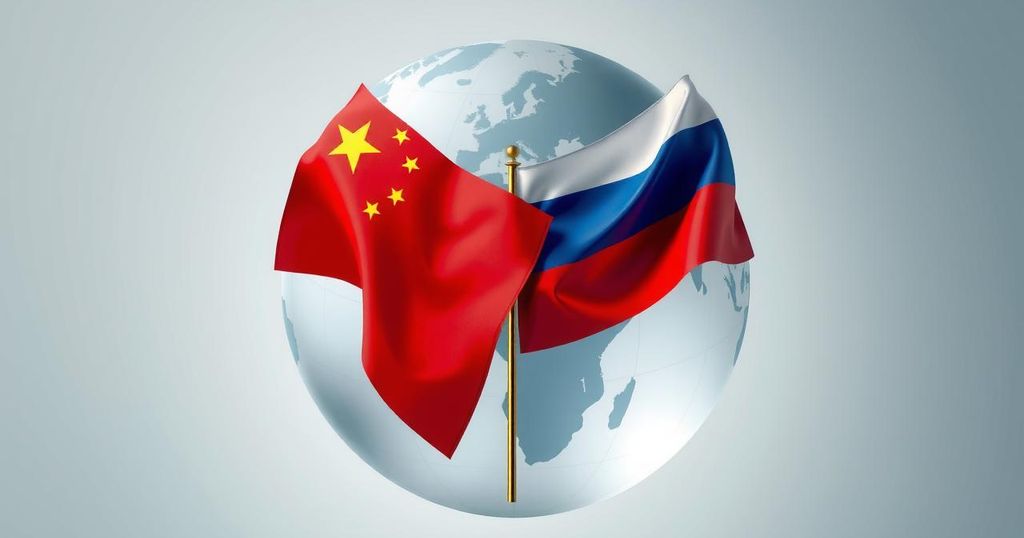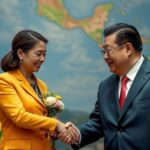China Monitors Trump’s Ukraine Strategy While Solidifying Russian Ties
China is closely monitoring the U.S. strategy regarding the Ukraine crisis under President Trump while reinforcing its partnership with Russia. Recent diplomatic engagements signal China’s dual focus: seeking to present itself as a supporter of Ukraine and emphasizing its relationship with Moscow amid ongoing tensions. The complexities of the situation raise questions about China’s genuine intentions and the implications for global diplomatic dynamics.
Amidst the ongoing conflict in Ukraine, China is closely observing the United States’ approach under President Donald Trump to resolve the situation. Experts indicate that Beijing aims to position itself as a strategic ally for Ukraine while sustaining its close ties with Russia. Recent high-level meetings held in Washington among British Prime Minister Keir Starmer, French President Emmanuel Macron, and other leaders emphasize the unfolding developments.
Following significant discussions between U.S. and Russian officials in Riyadh, President Xi Jinping engaged with President Vladimir Putin to reaffirm their “comprehensive strategic partnership.” China’s official statements continue to refer to the situation as a “crisis,” eschewing the term “war” when discussing Russia’s actions in Ukraine. This nuanced framing suggests an ongoing effort by China to maintain its diplomatic stance while expressing support for peaceful resolutions.
Chinese Foreign Minister Wang Yi emphasized China’s commitment to playing a constructive role in the political settlement of the crisis while engaging Ukraine as an essential trading partner since 2011. However, the lack of mention of Ukraine’s sovereignty in official communications raises questions about China’s intentions and the comprehensive nature of its support for Ukraine’s territorial integrity.
Amid these dynamics, U.S. Secretary of State Marco Rubio clarified that recent talks between Washington and Moscow do not aim to negotiate a deal about Ukraine, but rather to assess Russia’s sincerity in resolving ongoing hostilities, stressing the importance of re-establishing channels of communication.
Analysts assert that China remains apprehensive about potential shifts in U.S.-Russia relations, as any easing of sanctions could reduce Moscow’s reliance on Beijing. Former White House advisor Dennis Wilder noted that although a complete thaw in relations seems unlikely, the prospect of reduced Russian dependency is a concern for China. Many believe the U.S. risks projecting an image of unreliability, thereby aiding China’s information narrative globally.
A spokesperson from the Chinese Foreign Ministry refrained from addressing whether China might deploy peacekeeping forces to Ukraine post-conflict, as both Xi and Putin plan reciprocal visits later this year. Former officials express skepticism regarding China’s willingness to actively facilitate an end to the conflict, suspecting that any gesture toward peace would primarily serve Beijing’s interests.
In conclusion, as China navigates its strategic partnerships amid the Ukraine crisis, its careful diplomatic language and positioning signal an intent to balance relations with both Russia and Ukraine, while revealing inherent anxieties about U.S. involvement. The unfolding situation remains complex, with implications for regional stability and global geopolitical dynamics.
In summary, China’s approach to the Ukraine crisis illustrates its delicate balancing act between supporting Ukraine and maintaining a strong partnership with Russia. The ongoing diplomatic engagement between major powers highlights the complexities of the situation, reflecting concerns over potential shifts in U.S.-Russia relations. The commitment from China to play a constructive role remains yet to be evaluated, particularly regarding its potential influence over Ukraine’s territorial integrity and peace initiatives.
Original Source: www.voanews.com








Post Comment